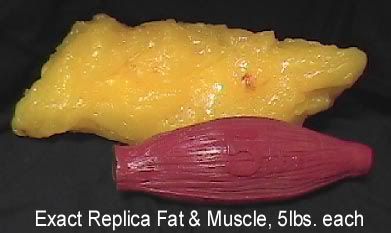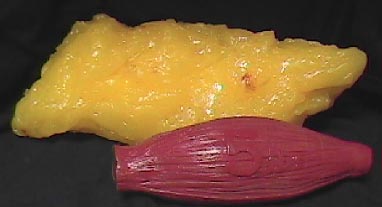Muscle VS Fat

Malani2010
Posts: 245
I got this from the Shape Magazine. Now it says that muscle DOES NOT weigh more than fat!!! I don't know what to believe!!!! I need some insight on this article!!!!
~Some of my clients weigh themselves daily, others not at all. In my experience what’s best depends on your relationship with the number. Some research indicates that people who weigh in daily are more successful at losing weight and keeping it off. But, if you tend to become stressed or obsessive about the number staring back at you, banishing the scale may be best. In any case, understanding how weight works is key. Here are three facts to keep in mind:
Fluctuations are Normal
When you step on the scale, you're weighing everything that has weight, not just your muscle, bone, and body fat, but also water, undigested food (even if it will all later be burned off), and waste that your body hasn't eliminated yet. The latter three are why your weight on a scale can shift very quickly, even if your body fat remains exactly the same. Sodium is another factor. It’s attracted to water like a magnet, so if you eat more sodium than usual, you’ll temporarily retain more water. Two cups (16 oz) of water retention equals one pound on the scale, yet you could be losing body fat at the same time. Bottom line: weight fluctuations from hour to hour or day to day are completely normal and to be expected. What’s most helpful is understanding your personal patterns - maybe you weigh more during a certain time of the month, or after eating a meal that’s saltier than usual. Rather than worrying about slight ups and downs, focus on putting blips in perspective and tracking larger changes over longer spans of time.
Pounds Don’t Tell the Whole Story
Two women can be the same height and the one who weighs more may be healthier, in better shape, or even wear a smaller size. While it’s not true that muscle weighs more than fat - a pound of muscle and a pound of fat both weigh a pound - muscle is more compact. If you think about the size of a pound of chicken breast compared to the size of a pound of shortening you can see the difference. The truth is a body that’s leaner (more muscle, less fat), well nourished and hydrated will weigh more than one that’s less toned, undernourished and dehydrated. It’s the quality of those pounds that matters most.
Weight Doesn’t Dictate Health
We live in a very weight-focused culture, but the truth is being at your ideal weight doesn’t guarantee health, and being overweight doesn’t automatically make you unhealthy. I’ve counseled women who have achieved the “right” weight for their height, but struggle with low bone density, a weakened immune system, fatigue, and hormone imbalances. I’ve also worked with fit women with higher than ideal weights who are amazingly strong, eat healthfully and have cholesterol, blood pressure and blood sugar numbers all within the normal ranges. While weight can provide some important info, it’s one piece of a much bigger health puzzle.~
~Some of my clients weigh themselves daily, others not at all. In my experience what’s best depends on your relationship with the number. Some research indicates that people who weigh in daily are more successful at losing weight and keeping it off. But, if you tend to become stressed or obsessive about the number staring back at you, banishing the scale may be best. In any case, understanding how weight works is key. Here are three facts to keep in mind:
Fluctuations are Normal
When you step on the scale, you're weighing everything that has weight, not just your muscle, bone, and body fat, but also water, undigested food (even if it will all later be burned off), and waste that your body hasn't eliminated yet. The latter three are why your weight on a scale can shift very quickly, even if your body fat remains exactly the same. Sodium is another factor. It’s attracted to water like a magnet, so if you eat more sodium than usual, you’ll temporarily retain more water. Two cups (16 oz) of water retention equals one pound on the scale, yet you could be losing body fat at the same time. Bottom line: weight fluctuations from hour to hour or day to day are completely normal and to be expected. What’s most helpful is understanding your personal patterns - maybe you weigh more during a certain time of the month, or after eating a meal that’s saltier than usual. Rather than worrying about slight ups and downs, focus on putting blips in perspective and tracking larger changes over longer spans of time.
Pounds Don’t Tell the Whole Story
Two women can be the same height and the one who weighs more may be healthier, in better shape, or even wear a smaller size. While it’s not true that muscle weighs more than fat - a pound of muscle and a pound of fat both weigh a pound - muscle is more compact. If you think about the size of a pound of chicken breast compared to the size of a pound of shortening you can see the difference. The truth is a body that’s leaner (more muscle, less fat), well nourished and hydrated will weigh more than one that’s less toned, undernourished and dehydrated. It’s the quality of those pounds that matters most.
Weight Doesn’t Dictate Health
We live in a very weight-focused culture, but the truth is being at your ideal weight doesn’t guarantee health, and being overweight doesn’t automatically make you unhealthy. I’ve counseled women who have achieved the “right” weight for their height, but struggle with low bone density, a weakened immune system, fatigue, and hormone imbalances. I’ve also worked with fit women with higher than ideal weights who are amazingly strong, eat healthfully and have cholesterol, blood pressure and blood sugar numbers all within the normal ranges. While weight can provide some important info, it’s one piece of a much bigger health puzzle.~
0
Replies
-
although completely unscientific - I once lost 30 lbs and went clothes shopping with a friend. We tried on the same dress and it fit us both. I weighed 20 lbs more than her. At the time I was a soccer player and worked out - she didn't work out at all. That was my experience - so I believe muscle weighs more (oh - we are the exact same height too!).0
-
when people say "muscle weighs more than fat" they mean that for a given volume (amount of space that it takes up) muscle weighs more than fat.
So if you had to bricks of the same exact size--one composed of muscle and one composed of fat--the one composed of muscle would weigh more.
Put another way...if you were to look at 5 pounds of muscle and compare it to 5 pounds of fat...the fat would be bigger.0 -
Muscle does not necessarily weigh more than fat. A pound is a pound. However a pound of muscle is smaller than a pound of fat because as the article says, "Muscle is more compact" even though they weigh the same. It is a matter of density. That is why a muscular person can weigh more than less muscular person of the same "size".0
-
I got this from the Shape Magazine. Now it says that muscle DOES NOT weigh more than fat!!! I don't know what to believe!!!! I need some insight on this article!!!!
~Some of my clients weigh themselves daily, others not at all. In my experience what’s best depends on your relationship with the number. Some research indicates that people who weigh in daily are more successful at losing weight and keeping it off. But, if you tend to become stressed or obsessive about the number staring back at you, banishing the scale may be best. In any case, understanding how weight works is key. Here are three facts to keep in mind:
Fluctuations are Normal
When you step on the scale, you're weighing everything that has weight, not just your muscle, bone, and body fat, but also water, undigested food (even if it will all later be burned off), and waste that your body hasn't eliminated yet. The latter three are why your weight on a scale can shift very quickly, even if your body fat remains exactly the same. Sodium is another factor. It’s attracted to water like a magnet, so if you eat more sodium than usual, you’ll temporarily retain more water. Two cups (16 oz) of water retention equals one pound on the scale, yet you could be losing body fat at the same time. Bottom line: weight fluctuations from hour to hour or day to day are completely normal and to be expected. What’s most helpful is understanding your personal patterns - maybe you weigh more during a certain time of the month, or after eating a meal that’s saltier than usual. Rather than worrying about slight ups and downs, focus on putting blips in perspective and tracking larger changes over longer spans of time.
This is simple--it's important to realize that the body is going to fluctuate for a multitude of reasons. Being slightly dehydrated can make you weigh several pounds less than normal--on the flipside...water retention can make you several pounds heavier. Water retention can occur due to sodium, a hard workout, or TOM.
Pounds Don’t Tell the Whole Story
Two women can be the same height and the one who weighs more may be healthier, in better shape, or even wear a smaller size. While it’s not true that muscle weighs more than fat - a pound of muscle and a pound of fat both weigh a pound - muscle is more compact. If you think about the size of a pound of chicken breast compared to the size of a pound of shortening you can see the difference. The truth is a body that’s leaner (more muscle, less fat), well nourished and hydrated will weigh more than one that’s less toned, undernourished and dehydrated. It’s the quality of those pounds that matters most.
So, two people can be the same exact height--one can be 10 pounds lighter than the other and the heavier one appears thinner, more fit, and healthier. Muscle is critical in creating that distinction. If you are only concerned about the number on the scale you're missing the larger picture because the pounds aren't the bottom line--it's what the pounds are made of.Weight Doesn’t Dictate Health
We live in a very weight-focused culture, but the truth is being at your ideal weight doesn’t guarantee health, and being overweight doesn’t automatically make you unhealthy. I’ve counseled women who have achieved the “right” weight for their height, but struggle with low bone density, a weakened immune system, fatigue, and hormone imbalances. I’ve also worked with fit women with higher than ideal weights who are amazingly strong, eat healthfully and have cholesterol, blood pressure and blood sugar numbers all within the normal ranges. While weight can provide some important info, it’s one piece of a much bigger health puzzle.~
This is basically saying that weight cannot be used as the sole determinant of health--some thin people are less healthy than heavier, more active individuals. Being overweight doesn't necessarily mean unhealthy, and being thinner doesn't mean healthy. It matters what you do to take care of the body you've been given.
I hope this helps!0 -
when people say "muscle weighs more than fat" they mean that for a given volume (amount of space that it takes up) muscle weighs more than fat.
So if you had to bricks of the same exact size--one composed of muscle and one composed of fat--the one composed of muscle would weigh more.
Put another way...if you were to look at 5 pounds of muscle and compare it to 5 pounds of fat...the fat would be bigger.
You said it perfectly. The statement 'muscle weighs more than fat' drives me insane. Not directed at anyone specific, but please return to middle school science and review density (mass/volume). Muscle is more dense than fat, and thus takes up less space for the same mass (or weight).0 -
You need a third dimension for it to make sense.....here is how I look at it - a cubic inch of muscle weighs more than a cubic inch of fat......(see the link below for picture)
I weigh nearly 25 lbs more than my friend (same height), but she can not fit into the pants that I wear... I work out at the gym 4 times a week, and walk / cycle the other days - she does no exercise at all
......http://www.onemorebite-weightloss.com/muscle-to-fat.html..... 0
0 -
1 pound of muscle weighs the EXACT same as 1 pound of fat.
Muscle is more dense and therefore takes LESS SPACE.
Think about the size of a brick and how much a brick weighs. Now think about feathers. How many feathers would you need in order for the feathers to weight the same amount as the brick. A room full.
The brick is muscle. The feathers is fat.0 -
You're thinking in volumes, the article is talking about mass. 1lb of muscle DOES weigh the same as 1lb of fat, just like 1lb of feathers weigh the same as 1lb of lead. The difference is the volume - in the same way that 1lb of feathers may fill a small room while 1lb of lead will fit in your hand - the same is true of muscle/fat. 1lb of muscle takes up a lot less space then 1lb of fat - hence a gym-go'er can weigh a lot more then a non-gym-go'er, but still be smaller!0
-
when people say "muscle weighs more than fat" they mean that for a given volume (amount of space that it takes up) muscle weighs more than fat.
So if you had to bricks of the same exact size--one composed of muscle and one composed of fat--the one composed of muscle would weigh more.
Put another way...if you were to look at 5 pounds of muscle and compare it to 5 pounds of fat...the fat would be bigger.
Or put another way ... a pound of feather versus a pound of rocks. Which is more? Although a pound is a pound, there are going to be a tonne more feathers, lol.0 -
*headdesk*0
-
What kind of idiot thinks a pound of anything weighs more than a pound of anything else? It's semantics. Using that logic, everything weighs the same.0
-
Is my motorcyle at 10 mph faster than my bicycle at 10 mph?What kind of idiot thinks a pound of anything weighs more than a pound of anything else? It's semantics. Using that logic, everything weighs the same.0 -
Thanks guys!!! This explains a lot. I have always heard this from overweight ppl and my family....I guess I wasn't understanding the article. I am starting to understand it now!!! That is what I am going through right now. I didn't lose weight this last weigh in but come to find out I lost another pants size and so I was a little confused.0
-
Excellent. You are doing well. There are many on here that would say losing a pants size is a big deal (and more meaningful than a number on the scale). Congratulations.Thanks guys!!! This explains a lot. I have always heard this from overweight ppl and my family....I guess I wasn't understanding the article. I am starting to understand it now!!! That is what I am going through right now. I didn't lose weight this last weigh in but come to find out I lost another pants size and so I was a little confused.0 -
We've been trying to explain this to MFPeeps for years.
:flowerforyou:0 -
Muscle weighs more than fat is a perfectly acceptable thing to say and is accurate. It's the same as saying, "rocks weigh more than feathers." Nobody is saying that a 1 pound of something weighs more than 1 pound of something. Don't be dense (pun intended).0
-
Thanks guys!!! This explains a lot. I have always heard this from overweight ppl and my family....I guess I wasn't understanding the article. I am starting to understand it now!!! That is what I am going through right now. I didn't lose weight this last weigh in but come to find out I lost another pants size and so I was a little confused.
Congrats - have you been taking measurements of body areas - like waist, thighs, hips and arms? If not do that - while the scale is a nice gauge to give you a ball park if you are eating right and working out then hopefully you are loosing body fat...if you have a lot of body fat then it is possible to only loose a few lbs but be able to wear a different size in pants or dresses.
Since the beginning of the year I have only lost a total of 12 lbs...BUT my bodyshape has changed a lot - I've only lost an inch or so in my waist and hips BUT I have lost 3 inches off each of my thighs (guess I figured out where the bulk of my fat was being stored) - my arms stayed the same - but now when I flex you can see definition lines (and the underside doesn't flutter as much)0 -
Muscle weighs more than fat is a perfectly acceptable thing to say and is accurate. It's the same as saying, "rocks weigh more than feathers." Nobody is saying that a 1 pound of something weighs more than 1 pound of something. Don't be dense (pun intended).
You know I am or was seriously confused here!!! Your comment sounded kind of rude. I am trying not to freak out at the scale not moving and was needing some insight. IF you think I am stupid for asking then just keep it to your self and don't be rude!!0 -
You are correct up until your "Nobody is saying...." statement. The debate over the weight difference between 10 pounds of muscle and 10 pounds of fat (as well as 10 pound barbells and 10 pound reams of paper) has erupted on MFP multiple times. So clarity is needed.Muscle weighs more than fat is a perfectly acceptable thing to say and is accurate. It's the same as saying, "rocks weigh more than feathers." Nobody is saying that a 1 pound of something weighs more than 1 pound of something. Don't be dense (pun intended).0 -
Muscle weighs more than fat is a perfectly acceptable thing to say and is accurate. It's the same as saying, "rocks weigh more than feathers." Nobody is saying that a 1 pound of something weighs more than 1 pound of something. Don't be dense (pun intended).
You know I am or was seriously confused here!!! Your comment sounded kind of rude. I am trying not to freak out at the scale not moving and was needing some insight. IF you think I am stupid for asking then just keep it to your self and don't be rude!!
I wasn't talking to anyone in particular.0 -
You are correct up until your "Nobody is saying...." statement. The debate over the weight difference between 10 pounds of muscle and 10 pounds of fat (as well as 10 pound barbells and 10 pound reams of paper) has erupted on MFP multiple times. So clarity is needed.Muscle weighs more than fat is a perfectly acceptable thing to say and is accurate. It's the same as saying, "rocks weigh more than feathers." Nobody is saying that a 1 pound of something weighs more than 1 pound of something. Don't be dense (pun intended).
Well, those people are silly, then.0 -
By weight a pound is a pound, but by VOLUME muscle weighs more.
Muscle has greater density ie 1 pound of fat has more volume than one pound of muscle.
People can't seem to grasp this, and they argue like dolts...lol0 -
Bump - great article0
-
LOL this old chestnut!
This photo is all you need to see: http://www.onemorebite-weightloss.com/images/fat-v-muscle.jpg
http://www.onemorebite-weightloss.com/muscle-to-fat.html0 -
LOL this old chestnut!
This photo is all you need to see: http://www.onemorebite-weightloss.com/images/fat-v-muscle.jpg
http://www.onemorebite-weightloss.com/muscle-to-fat.html
That's exactly what I was looking for. Muscle doesn't weigh more than fat. Muscle is lean, in comparison the the same amount in fat. Hence why two people the same weight and height would wear different sizes, one has more fat than the other.0 -
Let's even take it a step further. Just in my experience, the people who state the infamous "muscle weighs more than fat" are frequently (perhaps even usually) the same people who have just started weight lifting or working out. They're saying it because their volume, as judged by appearance, probably hasn't changed, and yet the number on the scale did. I'm not going to even touch the idea of judging volume by sight.
While it's likely that muscle and fat are irrelevant because it's probably just water retention, I think the subtext of volume at least seeming equal in this context is sound. Hence, getting prickly because someone didn't explicitly point out the implied "by volume" when making the statement might indicate that someone is just trying to start something.0 -
1 pound of muscle weighs the EXACT same as 1 pound of fat.
Muscle is more dense and therefore takes LESS SPACE.
Think about the size of a brick and how much a brick weighs. Now think about feathers. How many feathers would you need in order for the feathers to weight the same amount as the brick. A room full.
The brick is muscle. The feathers is fat.
I like that example.0 -
You are correct up until your "Nobody is saying...." statement. The debate over the weight difference between 10 pounds of muscle and 10 pounds of fat (as well as 10 pound barbells and 10 pound reams of paper) has erupted on MFP multiple times. So clarity is needed.Muscle weighs more than fat is a perfectly acceptable thing to say and is accurate. It's the same as saying, "rocks weigh more than feathers." Nobody is saying that a 1 pound of something weighs more than 1 pound of something. Don't be dense (pun intended).
Clarity is needed only for those who see the word "pound" where it hasn't actually been used.0 -
when people say "muscle weighs more than fat" they mean that for a given volume (amount of space that it takes up) muscle weighs more than fat.
So if you had to bricks of the same exact size--one composed of muscle and one composed of fat--the one composed of muscle would weigh more.
Put another way...if you were to look at 5 pounds of muscle and compare it to 5 pounds of fat...the fat would be bigger.
This. And seriously - but who would ever compare in any way other than volume?? That's like saying, "Cement doesn't weigh more than feathers because of pound of cement weighs the same as a pound of feathers." Well... um, yeah - but that's just such an odd statement to make and a very bizarre comparison. We're talking about when comparing the same VOLUME because one item is more DENSE than the other. So yes, "weigh more" is probably incorrect and we should say "more dense" but that's really just semantics. Think back to middle school science and math class, my friends!0 -
You need to read it carefully: "While it’s not true that muscle weighs more than fat - a pound of muscle and a pound of fat both weigh a pound - MUSCLE IS MORE COMPACT." (emphasis added)0
This discussion has been closed.
Categories
- All Categories
- 1.4M Health, Wellness and Goals
- 394.1K Introduce Yourself
- 43.9K Getting Started
- 260.4K Health and Weight Loss
- 176.1K Food and Nutrition
- 47.5K Recipes
- 232.6K Fitness and Exercise
- 437 Sleep, Mindfulness and Overall Wellness
- 6.5K Goal: Maintaining Weight
- 8.6K Goal: Gaining Weight and Body Building
- 153.1K Motivation and Support
- 8.1K Challenges
- 1.3K Debate Club
- 96.4K Chit-Chat
- 2.5K Fun and Games
- 3.9K MyFitnessPal Information
- 15 News and Announcements
- 1.2K Feature Suggestions and Ideas
- 2.7K MyFitnessPal Tech Support Questions














